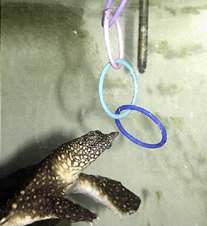Nearly two decades into the new millennium and my kids have dragged me into the 21st century by buying me an iPhone for Christmas and helping me set up an Instagram account. (Follow me, if you feel the urge, at bow_teye.) I am now a player in the social media game! My aim is to provide one case every day, from aberrant eyelashes in a dog, through the eyelid lesions of puppy strangles, to lens luxation in a cat, just to describe the first three posts.
The joy of ophthalmology being such a visual discipline – if you’ll excuse the pun – is that if you see a case of distichia or meibomitis or anterior lens displacement, you will hopefully never forget it. That said, if you haven’t, it can be pretty tricky to interpret what you are seeing. Such cases happen on a daily basis for me, but maybe once in a blue moon in a general practice setting. By putting a new case up every day, with any luck, in a year you’ll have built up a real library of examples that will help in evaluating any eye that comes along.
Putting cases online has been eye-opening for me already. It has to be said, I have only been a little active online up until now – spending an hour or so each evening answering questions posed via my website. But not until I began this Instagram account did I realise quite how all-encompassing the virtual world can be.
Of course, I’ve seen people walking along glued to their devices. But only now have I realised that if you pay attention to every Instagram upload or every tweet that comes your way, your whole life very soon becomes immersed in this virtual world. And the number of followers you have and number of likes you get on a post could quite easily become a real fixation.
I guess many of you will be saying “welcome to our world” but it concerns me that in January 2019, the Royal College of Paediatrics and Child Health said that “evidence is weak for a threshold to guide children and parents to the appropriate level of screen time, and [that they] are unable to recommend a cut-off for children’s screen time overall.”
It was Hesiod, more than 2,500 years ago, who first said “Moderation in all things.” I suppose anything that is addictive (as the virtual world can easily become, seeing how much time Instagram has taken up recently for me!) is difficult to hold in moderation.
Hold on for a moment though – is “moderation in all things” really the right way to go? Is it reasonable just to be moderate in helping people or in telling the truth? No, of course it isn’t – in doing good, surely, we want to “go the extra mile”, as Jesus said, not just be moderate. Along similar lines, another word that concerns me is “tolerate”. When we tolerate a person or a situation, we agree to put up with them rather than to welcome them with open arms.
Maybe our patients can teach us a lesson or two. I think perhaps we need to have a terrier-ish attitude in life, bouncing up with tail a-wagging rather than being a lugubrious Bassett Hound dragging ourselves along as if the world was about to end.
In a recent university meeting, a colleague, upon seeing my enthusiasm, asked me what I was on and whether he could have some of it. I don’t think that seeing the positive side of life could be put in a pill, but seeing the bright side of the world isn’t something that should ever be pursued merely in moderation. As for social media, I’m all for snapping up every opportunity to enthuse you all with the wonders of ophthalmology!











